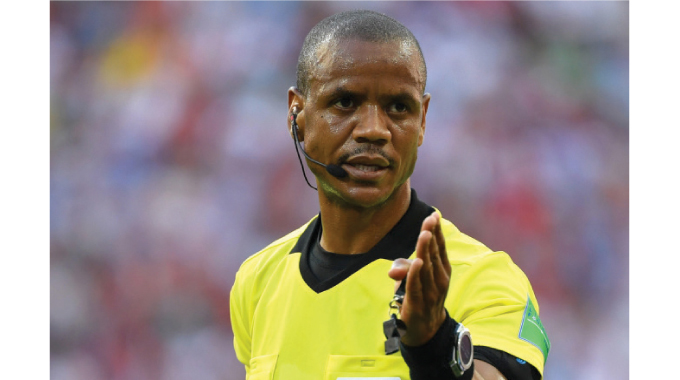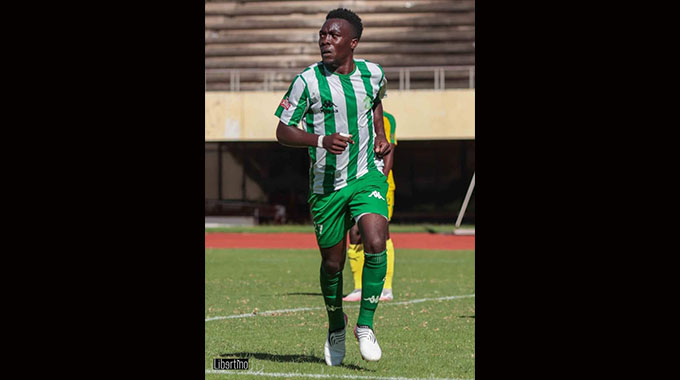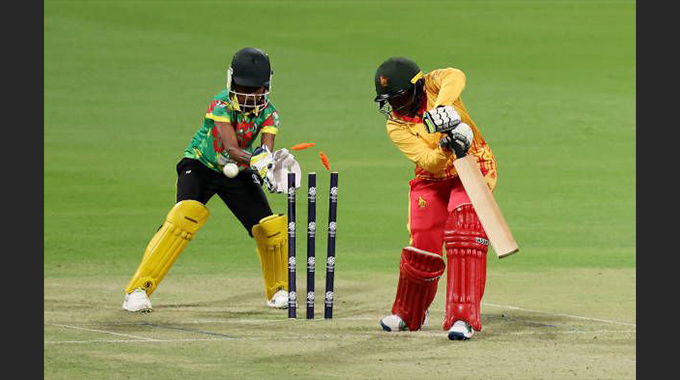Sikazwe’s Afcon meltdown joins a long list of shocking refereeing displays

FEW would have known Janny Sikazwe’s name prior to last Wednesday’s action at the Africa Cup of Nations, but after the debacle that unfolded in Mali’s 1-0 win against Tunisia, few will ever forget it.
The Zambian official delivered one of the worst refereeing performances in living memory after he blew the final whistle after just 85 minutes before restarting play, but then blew again with just 89 minutes and 43 seconds of the Group F clash gone.
His mistake drew a furious reaction from Tunisia’s bench, with boss Mondher Kebaier furiously grabbing the arm of the Zambian referee and pointing to his watch in the immediate aftermath of the full-time whistle.
The Tunisia head coach was then joined by his backroom staff in protesting, with Kebaier confronting one of the linesmen to complain about the game being brought to a premature end with his side losing 1-0.
Security staff had to surround Sikazwe, who refereed at the 2018 World Cup in Russia, and his two officials at the Limbe Stadium in Cameroon in order to keep angry Tunisia staff away from them.
There have been suggestions Sikazwe’s double error came after he stopped the match for a five-minute water break, but failed to pause his watch, while others say Sikazwe believed the extra four minutes 43 seconds played after his initial full-time whistle was stoppage time.
Tunisia’s coaches, however, were seemingly making a valid point with their initial protests about an early finish, with two lengthy VAR checks also taking place during the Group F clash. That is all without mentioning ignoring VAR advice telling him to overturn the extremely harsh red card he gave to Mali substitute El Bilal Toure.
Fortunately, Sikazwe is not the only official to have endured a nightmare 90 minutes on the pitch as the main official. Here, Sportsmail takes a look at some of the worst refereeing performances down the years.
Tom Henning Ovrebo – Chelsea v Barcelona, May 2009
This refereeing performance from Norwegian Tom Henning Ovrebo probably still makes Chelsea fans’ blood boil, and no doubt left their players incensed.
Ovrebo did dismiss Barcelona defender Eric Abidal in the second leg of the Champions League semi-final at Stamford Bridge. But that is probably the only favour he did for Chelsea that night.
The Blues were denied no fewer than four potential penalties during the 90 minutes. The first came when Florent Malouda looked to be brought down by Dani Alves inside the box, only for the referee to signal a free-kick just outside the box.
Didier Drogba had the next appeal when he was tugged back by Abidal but Ovrebo ignored his claims. Then 10 minutes from time, Gerard Pique survived after appearing to handle the ball under pressure from Nicolas Anelka.
The two most painful moments, howevery, came when Andres Iniesta equalised in stoppage time – after Michael Essien’s ninth-minute opener – to send eventual winners Barcelona to the final in Rome to play Manchester United.
But the hosts would have one more penalty appeal waved away when Michael Ballack’s volley appeared to strike Samuel Eto’o’s arm – and the German chased the referee back up the pitch to vent his fury.
Chaotic scenes then followed when the final whistle blew, with Ballack and Drogba chasing the referee, with the latter shouting ‘it’s a f***ing disgrace’ into a TV camera.
UEFA were forced to quickly to refute a conspiracy theory that the governing body were desperate to avoid a repeat of the 2008 final between the Blues and United.
But in 2012, Ovrebo did admit he was at fault during the game, although failed to fully apologise for his role in one of the darkest days for referees in European history
Andre Marriner – Chelsea v Arsenal, March 2014
Arsene Wenger’s 1,000th game in charge of Arsenal will be remembered as a nightmare by many more people than the Frenchman alone.
Among them will be referee Andre Marriner, who appeared to send off the wrong player in a case of mistaken identity at Stamford Bridge.
The Blues were already 2-0 up when they launched an attack which saw Eden Hazard’s curling shot tipped away and behind by midfielder Alex Oxlade-Chamberlain’s fingertips.
Marriner did not fail to award the penalty – one Hazard would go on to score – but instead showed the red card to Kieran Gibbs, a decision he would later apologise for.
The Gunners left-back was left confused and Oxlade-Chamberlain even told Marriner he was the guilty party. But Marriner’s decision stood and Gibbs had to make his way off just 15 minutes into what would be a 6-0 hammering for the visitors.
Mourad Daami – Nigeria v Cameroon, February 2000
Sikazwe is not alone when it comes to refereeing blunders at the Africa Cup of Nations.
Cameroon won their third AFCON title in 2000 after beating Nigeria on penalties after a 2-2 draw at the Lagos National Stadium.
The result, however, was shrouded in controversy after Victor Ikpeba’s fourth penalty for Nigeria was not awarded by the Tunisian referee Mourad Daami.
Television replays showed that the ball had hit the underside of the bar before crossing the line and then finally bouncing out.
The error proved decisive in terms of determining the eventual result, with Cameroon winning 4-3 on penalties as Nwankwo Kanu also missed his spot kick.
Riots followed in the aftermath of that incident.
Graham Poll – Croatia v Australia, June 2006
Australia’s 2-2 draw against Croatia in the World Cup Group F decider in Stuttgart was already wild enough.
The Socceroos came from behind twice to earn a point and qualify for the second round, but late drama saw the focus very much shift on to English referee Graham Poll.
The drama began through no fault of Poll, when he was left with no choice but to send Croatia’s Dario Simic off with five minutes to go for a second yellow, before Australia’s Brett Emerton received his marching orders too for a second bookable offence.
But it would be counting yellow cards which would be Poll’s undoing. Josip Simunic was first booked for fouling Harry Kewell just outside the box on 61 minutes.
So when the Croatian committed another foul on the centre circle just before stoppage time, many expected him to also see red.
However, astonishingly, Poll pulled out another yellow card without brandishing the red.
The drama then continued as Tim Cahill had a goal disallowed because Poll had already blown for full time, and then came to a head when Simunic was handed a third yellow of the match for dissent in the 93rd minute, followed finally by a long-overdue red card.
Poll faced the axe following an embarrassing display and joined the list of referees who were sent home from the World Cup.
He retired from refereeing international tournaments shortly afterwards.
The match at the time was only the fourth match in the history of the World Cup with three red cards, but it will be remembered for the number of yellows instead.
Charles Corver – West Germany v France, July 1982
Arguably the most outrageous foul in World Cup history took place when these two sides met at the Ramon Sanchez-Pizjuan in Seville in the semi-final.
France captain Michel Platini played a glorious pass for Patrick Battiston to run on to, and the latter guided a first-time shot past the outrushing Harald ‘Toni’ Schumacher just wide of the right-hand post.
But while most followed the ball out of play, those with keen eyes saw one of the most notorious incidents in World Cup history take place. Schumacher was never getting to the ball first and therefore had plenty of time to avoid Battiston.
Instead, the West Germany stopper continued heading forwards and saw his hip collide with Battiston’s face after moving his body in mid-air.
A motionless Battiston lost three teeth as a result and was quickly taken off the field on a stretcher to be given oxygen and transported to hospital.
Schumacher, meanwhile, acted as if nothing untoward had happened, chewing gum and calmly putting the ball down ready to take a goal kick.
So what should have seen Dutch referee Charles Corver award a penalty to France and hand a red card to Schumacher saw the game restart with a goal kick and the goalkeeper’s challenge go unpunished.
France have never made semi-finals easy for themselves in World Cup history, but this is where justice from the officials deserted them.
Ray Tinkler – Leeds v West Brom, April 1971
Ray Tinkler’s name is one Leeds United will remember for all the wrong reasons. The referee allowed play to continue despite his linesman flagging West Brom’s Colin Suggett offside.
Seeing the linesman’s flag, the Leeds defenced stopped dead in their tracks, but the Baggies followed Tinkler’s orders and played on, eventually scoring through Jeff Astle.
Tinkler was soon surrounded by Leeds players and several Leeds fans who had invaded the pitch and had to be escorted away from proceedings by police.
Leeds pulled a goal back through Allan Clarke but could not prevent a 2-1 defeat, with Tony Brown also scoring for West Brom.
That decision would ultimately prove fatal in the Elland Road outfit’s hopes of winning the league, with eventual champions Arsenal finishing just a point above them. – Daily Mail










Comments